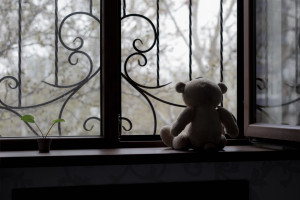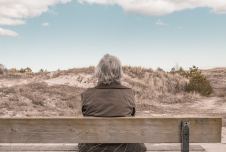“A policeman is on his way to see us,” my husband told me with a look that said it all, before adding, “they rarely bring good news.” With that one phone call, and the subsequent visit from Craig (a man I will never forget), our lives changed forever.

It was the start of a public holiday in 2014. We’d headed away merrily, three families looking forward to a weekend spent walking and biking backcountry trails in the South Island of New Zealand. Our beautiful daughter, 12-year-old Abi, had hopped in the car with her best friend, Ella, also 12, and Ella’s mum, Sally, a dear, dear friend of mine. As they rode down to meet the rest of us, a car drove straight through a stop sign on a backcountry road, crashing into them and killing all three instantly.
I remember the moment Craig told us of their deaths. A loss that will haunt us for the rest of our lives. I have a mental image of a road forking etched into my memory, with a vision of the new life path that now lay before us. I saw the enormous effort it was going to take to learn to live without our dear girl—an effort that would force me to put my own research into practice and to question the established narratives about grief.
Typical advice for grieving
Parental bereavement is considered to be the hardest of all losses to bear, meaning that, when you lose a child, you are swamped with support—some of it helpful, some less so. In the days after the girls died, we were told we should expect to write off the next five years to grief, and handed pamphlets explaining how “grief is as individual as a fingerprint” and outlining Elisabeth Kübler-Ross’s five stages of grief. Somehow, even the uninvited news that we were now prime candidates for divorce, mental illness, and family estrangement managed to trickle through.
Being one of those people who truly believes that knowledge is power, and frankly thankful for any kind of distracting activity, I threw myself into bereavement research, reading all I could to help me and my family survive Abi’s loss. To be honest, I was stunned by what I found there. Articles warned about the perils of “delayed” or “absent” grief (rare and pathological responses in the form of denial or avoidance); others questioned whether clinical treatments could be helpful at all for “complicated” grief. There was virtually no mention of the value of positive emotions when coping with loss, no articles on hope, gratitude, kindness, or bravery.
I appreciate the important message that there is no right way to grieve, but, as a resilience researcher trained in the tools of positive psychology, I quickly became frustrated by the passive tone of these recommendations. While it is undeniably useful to know the typical emotional and physical responses to bereavement, I yearned—with every bone in my body—to be told not what I was going to feel, but what I could do to help me and those I love adjust to this terrible, tragic, untimely loss. I wanted to be an active participant in my grief process. So, I turned my attention toward my training.
When I look back on it now, I consider myself extremely lucky to have been one of the few people in the world who’d been trained in how to apply resilience research to real-life challenges. I’d sat in the lecture halls at the University of Pennsylvania listening to Martin Seligman explain that the most common human response to adversity was not trauma, but in fact resilience; I’d been taught to dispute catastrophic thinking by Karen Reivich, who pioneered the U.S. Army’s Master Resilience Training; I’d learned about the power of using our strengths from Christopher Peterson and the importance of positive emotions for resilience from Barbara Fredrickson. In studying positive psychology, I’d stumbled upon a roadmap for navigating my way back from tragedy. Would these ways of thinking and acting work for me and my family now?
So began something of a personal experiment that has occupied me for the last five years. I wanted to test which of the theories and research findings from positive psychology might help us come to terms with Abi’s death. While I never expected to take away all the pain and longing, I wanted to investigate if certain ways of thinking and acting supported healthy adaptation to loss.
Strategies for resilient grieving
Writing this, five years on, I can confirm—from my own journey through grief and the (literally countless) emails, messages, and even letters I’ve received from the bereaved throughout the world—that there really is much we can do to help ourselves, and those we love, navigate life’s darkest days.
Here I want to share with you the strategies that have helped me most.
Accept the good. Drawing on the large body of research indicating that gratitude fosters well-being, I was determined to tune into the good that still remained in my life. “Choose life, not death,” my inner voice warned me. “Don’t lose what you have to what you have lost.” We are fortunate to have two beautiful sons to live for, who need us now and deserve to live as normal a life as possible. In psychology, we call this “benefit finding”; in our house, we call it “accepting the good.”
Hunt out positive emotions. In a study investigating U.S. college students’ responses to the 9/11 terrorist attacks, Fredrickson found that certain people showed resilience. What was their secret? Experiencing positive emotions buffered resilient people against depression and was the active ingredient that helped them thrive.
With that study firmly etched in my mind, I knew I had to somehow continue to top up our positive-emotion piggy banks. I returned to Fredrickson’s list of positive emotions time and time again, and very deliberately worked out ways to bring more hope, love, humor, pride, inspiration, serenity, and awe into our lives.
I asked friends to accompany me on day-long walks that would draw me out of the cluttered world of the city and reconnect me with nature. Standing amid towering mountain peaks returned a measure of serenity and filled me with awe. Making myself feel small and insignificant somehow fueled my belief that we could fight this battle and would emerge out the other side. I sought out movies that would inspire me, listened to the Desert Island Discs podcast to fill me with hope, and watched my boys play music and sports to give me a sense of pride.
Establish routines and rituals to keep their memories alive. I am so grateful for the work of researchers Michael Norton and Francesca Gino, through whom I discovered the importance of rituals for grief. According to their research, participating in rituals returns a feeling of control to the bereaved, and people who do so experience lower levels of grief.
Having lost my mother at a relatively early age (33 years), I think I’d subconsciously already created habits to honor her memory and keep her present: wearing her ring, baking her almond cake, having a bowl of mini eggs for the family to graze from at Easter time.
As you can see from this list, we’re not talking traditional mourning rituals here, but instead finding small ways to draw the deceased into your life. I often pick foliage as I’m walking the dogs, arranging it as artfully as I can to remind me of Sally; I wear Abi’s cardigan on cold days, we all buy her favorite potato chips in her memory, and I take her old school bag with me on holidays to “show” her what we see.
Likewise, I credit Thomas Attig for making me realize I didn’t have to entirely sever my connections with Abi. Even the title of his book, How We Grieve: Relearning the World, resonated deeply, as did his suggestion that we can “continue to ‘have’ what we have ‘lost,’ that is, a continuing, albeit transformed, love for the deceased.” Even though Abi is gone, it’s okay to keep loving her. I now recognize that I will always be her mum, she will always be part of our family, and her presence, however short, shaped us irrevocably.
None of these ways of thinking and acting completely take away the pain of her loss, although that has certainly lessened over time. And the above are just a taster of the strategies I found worked for me. One of my own studies demonstrated that well-being is different for everyone, and I have no doubt grief is the same. But what the research does suggest, and my own and others’ experiences support, is that there are things we can do to ease our journey through grief.
What works will be different for everyone, but I’d strongly recommend trying some new ways of thinking, being an active participant in your grief. That way, hopefully you, too, will see that it’s possible to continue to live, laugh, and love, even while we grieve.









Comments